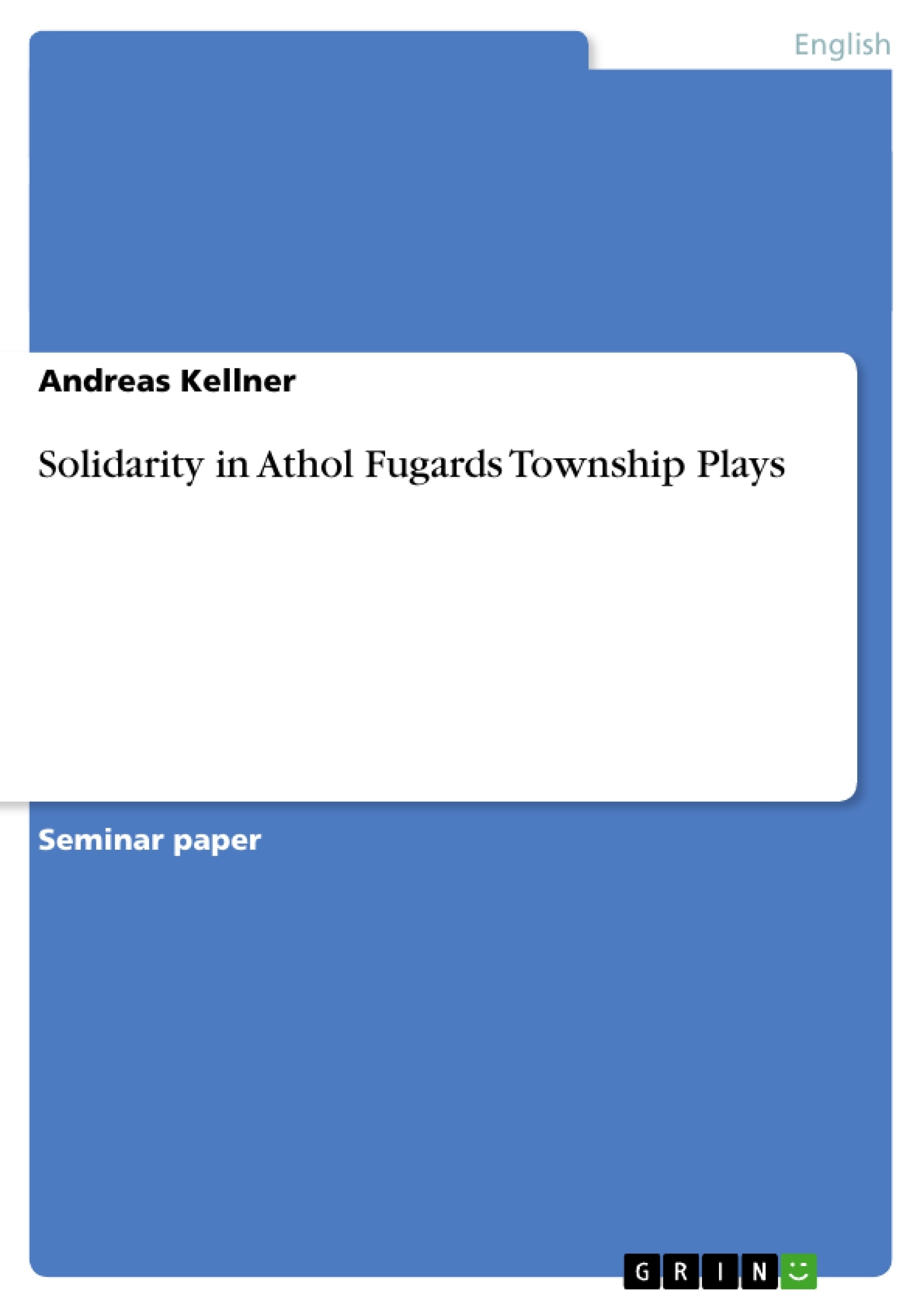At the moment solidarity is of topical interest more than ever. In the news we
hear of the decline of the welfare state, of cuts in social services. We discuss about
our solidarity with the United States of America with regard to the war in Iraq.
There are shows on television to collect money for poor countries in the third
world or for post-war reconstruction. These are all forms of solidarity. But what
really is solidarity?
This paper wants to have a closer look at the term "solidarity", its nuances and
its conditions. Solidarity depends on the society and on the time. As an example I
would like to examine the term on the basis of Athol Fugard's Township Plays.
The Township Plays are: No-good Friday (1958), Nongogo (1959), The Coat
(1966), Sizwe Bansi is Dead (1972) and The Island (1973). These five plays were
written under the conditions of the oppressive apartheid system which
characterized South Africa's politics since 1948. During the following years the
Whites oppressed the Blacks in a very cruel way, cut back their rights and made
them live and die under miserable circumstances. In such an inhumane situation
solidarity grows very fast and reaches its peak. I would now like to examine how
solidarity is described in the five South African plays, in which situations it
occurs. Furthermore, it may be interesting to look who acts in solidarity with
whom and in which situations there is perhaps even a lack of solidarity. These
shall be the main aspects of my paper.
Inhaltsverzeichnis (Table of Contents)
- Contents
- Introduction
- What does the term "solidarity" mean?
- No-good Friday
- Solidarity among Blacks
- Solidarity between Black and White
- Nongogo
- Solidarity on the part of the two main characters and on the part of the minor ones
- The Coat
- Sizwe Bansi is Dead
- Solidarity in the play
- The Island
- Conclusion
Zielsetzung und Themenschwerpunkte (Objectives and Key Themes)
This paper aims to explore the meaning and nuances of "solidarity" within the context of Athol Fugard's Township Plays. It examines the diverse ways in which solidarity manifests within the oppressive apartheid system of South Africa, paying particular attention to the dynamics between different social groups.
- The multifaceted concept of solidarity
- The role of solidarity under oppressive regimes
- Different forms of solidarity, including between Black and White communities
- The interplay of individual interests and collective needs
- The significance of solidarity as a social and political force
Zusammenfassung der Kapitel (Chapter Summaries)
- Introduction: This chapter introduces the concept of solidarity and its relevance in contemporary society, highlighting its multifaceted nature and emphasizing its historical and social context.
- What does the term "solidarity" mean?: This chapter explores the historical and philosophical roots of the term "solidarity", tracing its evolution from Roman legal terminology to its modern interpretations. It discusses the principle of "solidarity of classes" and its implications for social and political movements.
- No-good Friday: This chapter analyzes the play "No-good Friday", focusing on the different forms of solidarity exhibited among the characters. It investigates the dynamics of solidarity among Black communities and explores the complex relationship between Black and White individuals within the context of apartheid.
- Nongogo: This chapter summarizes the themes of solidarity in "Nongogo", examining the solidarity demonstrated by the main characters and exploring the broader implications of solidarity for the community depicted in the play.
- The Coat: This chapter provides a summary of "The Coat", analyzing the play's central themes and exploring the role of solidarity within the narrative.
- Sizwe Bansi is Dead: This chapter examines the concept of solidarity within the play "Sizwe Bansi is Dead", focusing on the various situations and relationships where solidarity is displayed.
- The Island: This chapter provides an overview of the play "The Island", highlighting the themes of solidarity and their significance within the context of the play.
Schlüsselwörter (Keywords)
This paper focuses on the concept of solidarity, particularly within the context of South Africa's apartheid era. Key terms include "solidarity," "apartheid," "Township Plays," "Athol Fugard," "Black," "White," "social justice," "oppression," and "community."
- Quote paper
- Andreas Kellner (Author), 2003, Solidarity in Athol Fugards Township Plays, Munich, GRIN Verlag, https://www.hausarbeiten.de/document/23410


